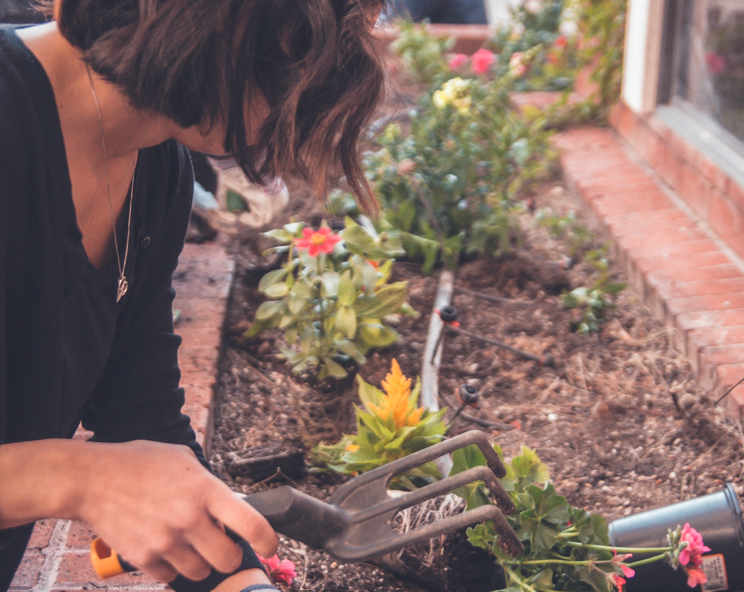Gardening can nurture nature’s best, in every part of your world
By Annie St-Amour
Since the start of the pandemic, many Canadians have discovered, or rediscovered, the joys of gardening—so many, in fact, that seed companies have reported stock shortages.
“In spring 2020, we created a garden to fight off boredom and depression and it kept us busy all summer,” says Johanne Fortin* of Saint-Hubert, Que. “I got up every morning feeling happy because I knew I’d be checking on my plants and harvesting any ripe fruits and vegetables. It was such a success that we did it again last year.”
The Healing Garden
Studies have demonstrated the positive effects of gardening on physical health, starting with the health of bones, which benefit from the sun. Researchers from the University of Arkansas observed increased bone density among women over 50 who gardened at least once a week. “The sun plays a role in the creation of vitamin D, which helps to strengthen bones,” says Dr. Isabelle Deschênes, a rheumatologist at Haut-Richelieu Hospital in Saint-Jeansur- Richelieu, Que.
Exercise strengthens muscles and improves muscle tone, promoting better balance and reducing the risk for falls and fractures. “When you garden, you move—you bend over, you kneel, you dig, you sometimes lift heavy loads,” Deschênes says, adding that it’s advisable to talk with your doctor before getting out your gardening gloves.
Gardening offers mental health benefits, as well. While negative thoughts can be as invasive as weeds, weeding, pruning, and digging can keep both at bay. “Psychological distress and the anxiety caused by COVID-19 have led to a lot of people taking up gardening,” says Christianne Bourgie, a mental health consultant at the Douglas Mental Health University Institute in Montreal. “Starting with a seed or a cutting and managing to nurture a living thing is really rewarding.” A garden needs to be cared for. “You have to nurture what you’ve planted, and that’s also a way to take care of yourself,” Bourgie says.
Gardening offers so many benefits that horticultural therapy is practised by experts all over North America. At the Douglas Institute, for example, which set up a gardening workshop in 1985, horticulture is one of several activities intended to support people with mental health concerns and help them integrate. “Our work involves helping them live a normal life,” says Jacques St-Hilaire, a horticulturalist in the institute’s greenhouses. “In some cases, patients’ symptoms have caused them to become isolated. Being able to get themselves organized to take on an activity is for them a victory in itself.”
This motivation, he adds, seems to go hand in hand with a sense of belonging to the community. “People arrive in the morning, get a coffee, and chat. Many have learned to socialize. For some, that’s difficult at the beginning, but being part of a group gives them a reason to get out of bed in the morning. On top of that, weeding a flowerbed or garden and turning over the soil is good for them physically.”
To help patients enjoy the benefits of gardening, Hôtel-Dieu Hospital in Sherbrooke, Que., created a garden for them in 2014 and established horticultural therapy workshops. The preliminary goal of the workshops was to improve participants’ cognitive health by showing them how to start a task and follow through to the point of harvesting the fruits of their labour. But these activities have met another objective, says Mario Parenteau, head of care and services in the hospital’s psychotic disorders unit. “With hindsight and based on the surveys we’ve done, we’ve realized that gardening makes the greatest difference when it comes to self-esteem. People are proud of their work.”
Today, more people are benefiting from the garden, as it’s now accessible to every resident. “For seniors in other care units, just walking in the garden and perhaps checking on the plants provides a sense of well-being,” Parenteau says.
For All Ages
Gardening can also help forge or strengthen bonds between generations. Les Urbainculteurs is a Quebec City not-for-profit that promotes gardening and urban agriculture. In addition to offering workshops, it creates gardens and landscapes for other organizations. “Most of our volunteers are retired people who attend leisure activities at a local recreation centre,” says communications officer Marie-Hélène Dubé. “It’s a great partnership. The harvest goes to the food bank, and those who participate come for the social side of things.”
Dubé cites as another example the community garden to which the seniors at a nearby residence have given a second life. “We built perennial beds and installed tall containers so people could garden without having to bend over,” she says. “This helped get the residents involved, and they became more physically active, getting outside again.”
In Lebel-sur-Quévillon, Que., a small community of 2,700 people, the seniors’ residence and the early childhood centre are neighbours. Julie Paquin, a dietitian at the local health centre, saw an opportunity to bring the young children and the older folk together. Last spring, each group started seedlings, and as summer began, they got together to plant them.
“The children would come over to tend the garden,” Paquin says. “That brought a lot of life to the yard and motivated residents to go outside for some fresh air, to move about more.”
The experience was just as gratifying for the children, who could chat with the seniors and get to taste some less familiar foods. “Little ones like putting their hands in the earth, and gardening is good for developing their dexterity,” Paquin says.
Select Your Season
While we generally plant in the spring, many fruits, vegetables, and flowers can be planted in the summer. A garden centre can give you more information.
Photo by Kenny Eliason on Unsplash






